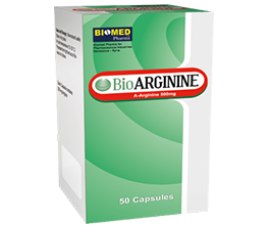Bioarginine
- L-Arginine
Each Capsule contains: L-Arginine 500 mg
Bioarginine
Composition
Each Capsule contains: L- Arginine 500 mg
Each 1ml of syrup contains: 100 mg arginine hydrochloride (83 mg as L- arginine base)
Description:
L-arginine is a protein amino acid. L-arginine is essential for young children and for those with certain rare genetic disorders in which synthesis of the amino acid is impaired. It plays a number of other roles in the body. These include the detoxification of ammonia formed during the nitrogen catabolism of amino acids via the formation of urea. In addition, L-arginine is a precursor in the formation of nitric oxide, creatine, polyamines, L-glutamate, L-proline, agmatin (a possible neurotransmitter in the brain) and the arginine-containing tetrapeptide tuftsin, believed to be an immunomodulator. L-arginine is a glycogenic amino acid; it can be converted to D-glucose and glycogen if needed by the body or it can be catabolized to produce biological energy.
L-arginine, when administered in high doses, stimulates pituitary release of growth hormone and prolactin and pancreatic release of glucagon and insulin. It is also used to help improve the immune status in those suffering from sepsis, burns and trauma.
Actions:
Supplemental L-arginine may have anti-atherogenic, antioxidant and immunomodulatory actions. It may also have wound-repair activity.
Usage:
L-arginine is administered in high doses to stimulate pituitary release of growth hormone and prolactin and pancreatic release of glucagon and insulin.
L-arginine shows promise in the treatment and prevention of cardiovascular disease (including atherosclerosis, hypertension, hyperlipidemia and angina pectoris).
L-arginine is used in some forms of male infertility.
L-arginine is used in some kidney disorders.
L-arginine is helpful in accelerating wound healing.
L-arginine has demonstrated some positive immune-modulating and anticancer effects.
L-arginine is helpful in some others with migraine, and liver disease.
Precautions:
Supplemental L-arginine is contraindicated in those with the rare genetic disorder argininemia. It is also contraindicated in those hypersensitive to any component of this product.
Because of the possibility of growth hormone stimulation, pregnant women and nursing mothers should avoid L-arginine supplementation.
Those with renal or hepatic failure should exercise caution in the use of supplemental L-arginine.
Although it is unlikely that those with a history of herpes simplex virus infection will have recurrences if they use L-arginine supplements, they should nevertheless be aware of this possibility.
Drug Interactions:
L-arginine may counteract the antinaturetic effect of cyclosporin.
L-arginine may increase the absorption of ibuprofen if taken concomitantly.
L-arginine supplements may potentiate the effects of organic nitrates, sildenafil citrate if taken concomitantly.
L-arginine, if used concomitantly, may enhance the effect of yohimbe.
Undesirable effects:
The most common adverse reactions are nausea, abdominal cramps and diarrhea.
Dosage:
Capsules: Take 1-2 capsules one to three times daily, or as recommended by a healthcare practitioner.
Syrup
Adults: 3-6g /day (1-2 spoonful 10ml 3 times daily) before meals.
Children: one spoonful 10ml 2-3 times daily.
Storage:
Store at room temperature (25 °C) Protected from light and out of the reach of children.
Keep tightly closed in a dry place; do not expose to excessive heat.
Presentation:
Bioarginine 500 mg: Box contains 50 capsules.
Bioarginine 500 mg: Box contains 100 capsules.
Bioarginine syrup: bottle of 100ml.

